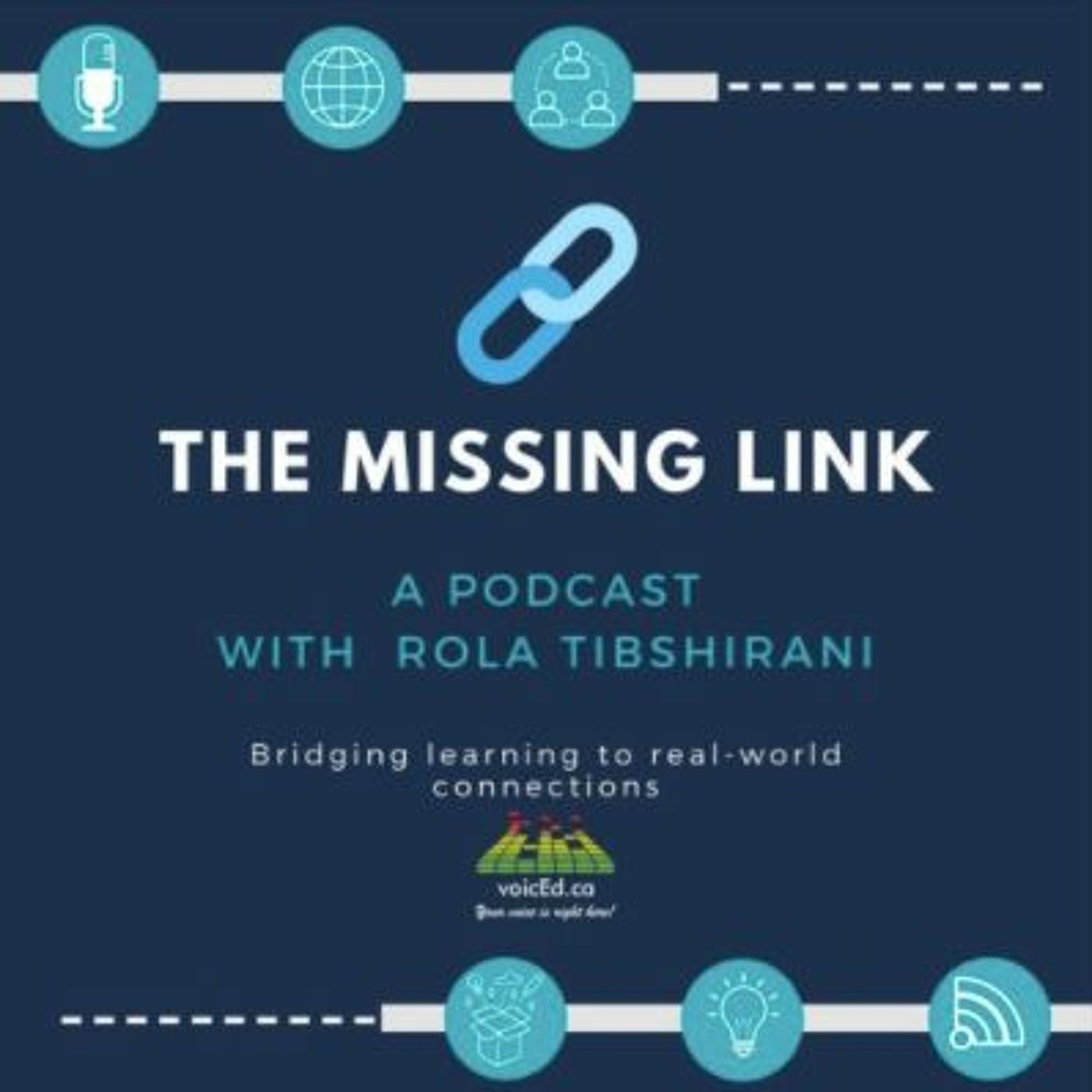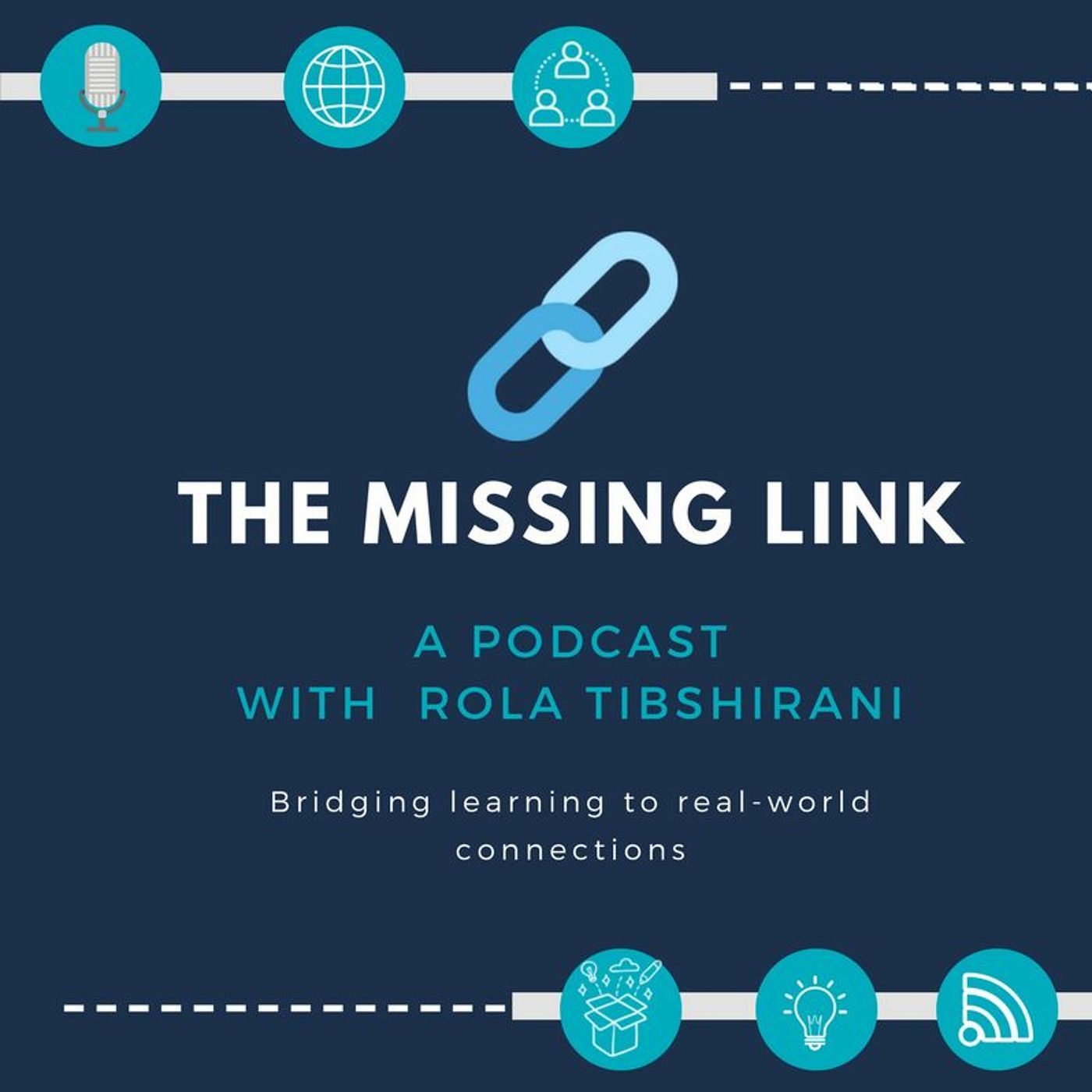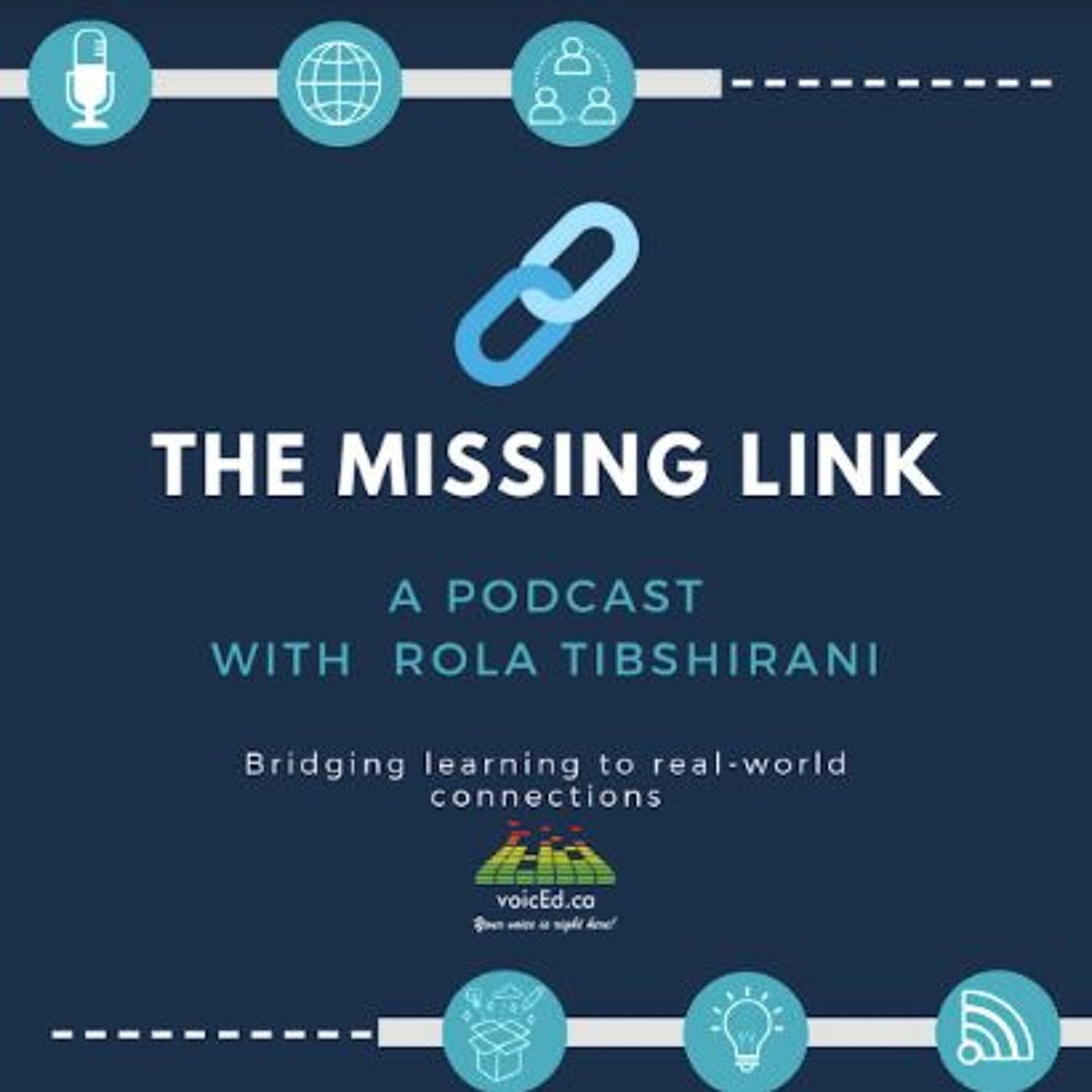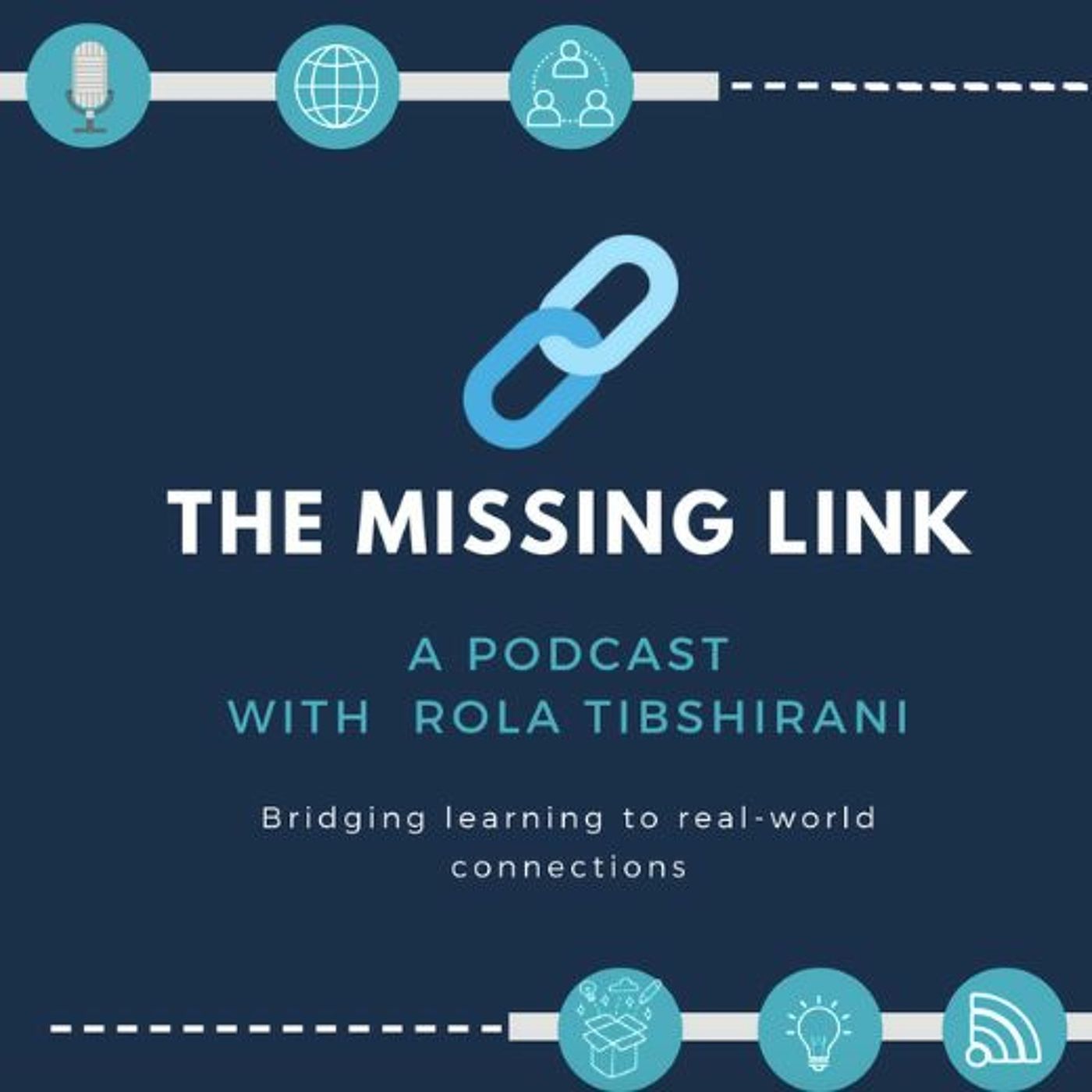Discover The Missing Link with Rola Tibshirani
The Missing Link with Rola Tibshirani

The Missing Link with Rola Tibshirani
Author: Rola Tibshirani
Subscribed: 1Played: 80Subscribe
Share
© Copyright voicEd Radio
Description
Rola Tibshirani invites educators to connect with many groups, organizations or individual educators to bring the learning from inside the classroom to connect with real-world projects. Rola also shares the pedagogical process and the purpose of connection based learning.
126 Episodes
Reverse
Jennifer Nieradka, a behaviourist Analyst with #OCSB @ocsbABA, shares Functions of Behaviour, reducing challenging behaviour through behaviour strategies and a skill-based approach. Listen to learn more about the 7 dimensions of #ABA to address behaviour that is observable, based on research. Goals have to be practical and meaningful for the students. The importance of the De-escalation plan to prioritize safety, relationships, Happy, Relaxed and Engaged in preventability as a starting point. Focus on the environmental variables for the learning context and identify the skills. #compasion #dignity #respect
Dr. Lyn Sharrat is a widely published researcher and author. She focuses her time and efforts on increasing each student’s growth and achievement by working alongside leaders and teachers to put FACES on their data, taking intentional action to make equity and excellence a reality for all students. Dr. Lyn Sharratt shares the importance of providing learning to everyone by ensuring where students are in our care in order for them to grow and lead.
Tom D'Amico, the Ottawa Catholic School Board director of education, shares that Iterative improvements are important to set yearly goals and improve yearly to continue learning. Transformative learning is important to challenge the status quo that is not serving everyone; the goal and the outcome are equality and social justice. Ethical leadership is important to have trust, support the dignity of every human being and create conditions to have a platform for all voices.
Livia has so much passion for leading with joy. Self-awareness is the foundation, and it is important to understand who you are, bringing strengths to anchor your values and beliefs. Believe in ourselves and meaningful connections, be compassionate leaders, and discover challenges as opportunities. Atomic interactions, small interactions of kindness, recognizing everyone, insightful reflections and emotional contagiousness for making a difference in people's lives.
Kim Lockhart shares the importance of the Science of Reading in a second language. The phonemic awareness of reading through all subjects in French and seeing learning through the Science of reading. Explicit instructions and explicit systematic instructions. Beefing up tier 1 instructions to the whole class is important. As educators, we need to give students more opportunities to practice.
The deep learning movement fosters all learners contributing to the common good. The progressions contribute to deep discussions used for peer assessment and self-assessment. The progressions are a way to anchor reflective conversation—a pedagogical transformation of a classroom culture where each student's voice is heard. The educators are adapting to the learning environment for stimulating learning through the 4 elements. Educators are learners who embed the experience to adapt when lessons are not working. They listen to the pros and cons, constantly observing and assessing themselves and their students. It is a continuous state of reflection. The educators admit that they don't know it all and that it is fine to be a co-learner, co-constructor, and co-designer to build authentic students' voices and agency. It is a messy shift for professional accelerations.
Sean Kelly is a superintendent of Intermediate and Secondary Student Success at the Ottawa Catholic School Board. Sean shares the importance of building relationships through listening for deep learning. He emphasizes the importance of giving opportunities to educators to be creative and passionate by highlighting the process and the next steps. Leaders need to recognize what needs to be prioritized for the benefit of the schools and the system. When leaders are creative, they bring everyone else with their creativity.
With the learners, give them a chance to ask questions & listen to understand than to respond! The curriculum goes hand in hand with building relationships & connections with the students. "Your story is the Soul in each lesson," centering students' voices & stories. Building with them learning based on their voices by tailoring & tweaking activities & tasks, is a vulnerable part of education, not just how, but the WHY. Getting to the why of learning tasks, what are the connections between the task to move students forward? To reach Tu https://twitter.com/tu_vuong. https://www.cominghometuvuong.com/
The adults need to feel comfortable speaking their minds by creating shared agreements. Employers are happier when they express their needs, when everyone comes together and co-creating with the leaders. Article to steps for the shared agreement. Empathy for perspective taking. https://www.edutopia.org/article/shared-agreements-working-together-benefit-teachers-and-administratorsSEL skills will be uplifted through PBL. Explore the topic, contact experts to seek advice, create solutions, and call to action by inviting others. https://bit.ly/3fx8Ky6Environmental Science for Grades 6-12 PBL for sustainability. The learners creating #calltoActionhttps://www.edutopia.org/article/3-ways-activate-student-engagementAction to research for professional learning. A 5 Step Coaching Model for Instructional Innovation https://www.edutopia.org/article/5-step-coaching-model-instructional-innovation
Community building is the essence of empowering the teachers, the students and the parents. Having the vision to have the confidence of empowering innovative progress through personalized comprehensive support of unlearning and relearning. A School wide initiative of Gratitude Attitude by thinking globally and acting locally. " Good leaders create great leadership with others. "
Liz Dozier shares about being aware of our biases and decolonizing our minds in terms of our own biases. We have to take care of ourselves physically, mentally, and spiritually, because you can’t begin to unpack those biases if you’re worn down. It is really about remaining curious about the world around us and others’ experiences. How are schools focusing on from problem fixing to possibility creating?
Melanie shares that we need to stop doing school and focus on deep learning. We need to create knowledge and focus on students' assets. It is a continuous process of shifting and dancing to access learning in the best possible way.
Hedreich Nichols shares the importance of teaching human kindness citizenship explicitly through the development of interpersonal relationships, examining feelings, and building empathy. Social actions already walk in with the students. We need to create a culture of kindness that models explicitly what kindness is and makes someone feel bad without attacking their character or behaviour. In the classroom, students are more empathetic than adults. We all have our own biases and perspectives. Allow students to take the lead, let their brilliance shine.More on Hedreich Nichols: https://hedreich.com/bio/https://anchor.fm/hedreich/episodes/SmallBites-Lagniappe-Teaching-from-a-Neutral-Space-e1bv1bohttps://us.amazon.com/Books-Hedreich-Nichols/s?rh=n%3A283155%2Cp_27%3AHedreich+Nichols
Making a difference in the lives of the students by maximizing their potential. By creating a culture in which students can take risks to take ownership of their learning. Creating clearer targets on why they are learning. Students should not be punished when they learn incorrectly. Educators should be transparent in their assessment practices. Students should understand self-assessment & feedback, as well as how grades are assigned at the end of the process. Students should explain their why and reflect on the process. Growing a growth mindset across a culture of understanding rather than competing to learn. The book, The Magic of Growth Mindset will be released soon. It is important for teachers to model growth mindsets as well, and for leaders to be aware of how they respond, it is more about the effort than how well they do. Get everyone to take some risks. A safe space for making mistakes, lots of modelling by leaders to teachers, and for the students to take it home.
Stephenie creates learning communities that support students' voices, agencies, and gamifications. Stephanie approaches coaching for teachers' through design thinking for pedagogical powerful ways. Following up with teachers about the process involves inspiring them through a coaching cycle. To learn more about Stephanie's initiatives, please visit her website : https://sites.google.com/mrshowell24.com/mrshowell24/home and https://www.goldedu.org/
Episode #112 Stephanie Howell by Rola Tibshirani
Ludenso focuses on discoveries for all ages through AR. Students create through 3D modelling to connect real authentic problem solving to the world. The tools are cocreated through the pedagogical process that encourages students' inquiries. Ludenso has based its AR on pedagogical practices and full feedback from teachers and students. There are SDGs challenges to create futuristic sustainable solutions by the students.
Educators are empowered to disrupt unjust systems and create change at the core of equity. To teach from an equity standpoint, we must first recognize our identity. To extend our learning, we must begin with ourselves first identifying ourselves before teaching the curriculum. Multiples perspectives are at the foundations of the curriculum. Students are given authentic tasks that explore perspectives from different angles. In what ways can students become change-makers and develop their responsibility for citizenship?
Project based learning moves forward with critical conversations that are students centred. Students centred learning designing engagement to relevance and empowerment of learning. "Project based learning and inquiry are the opportunities for students to uncover new content on their own. Through exploration and problem solving, children make truly remarkable discoveries (many of which teachers will not foresee)." School is about the students more than us!http://rosscoops31.com/
Mike shares the importance of designing through Project-Based Learning with an authentic purpose to problem solve. The framework for students to connect multidisciplinary through a structure of thinking, high-level questioning by both students and teachers. Projects start with a Driving Question (DQ) to engage students and frame the anticipated learning. Social-Emotional Learning skills are embedded in high-quality PBL. "The SEL framework emphasizes student behaviour in the classroom, whereas PBL applies it more globally to issues outside of themselves. But the skills are the same in each case, with PBL using Social Awareness to drive this decision making." It is not just about choice it is that purpose. http://www.michaelkaechele.com/marriage-of-sel-and-pbl/








